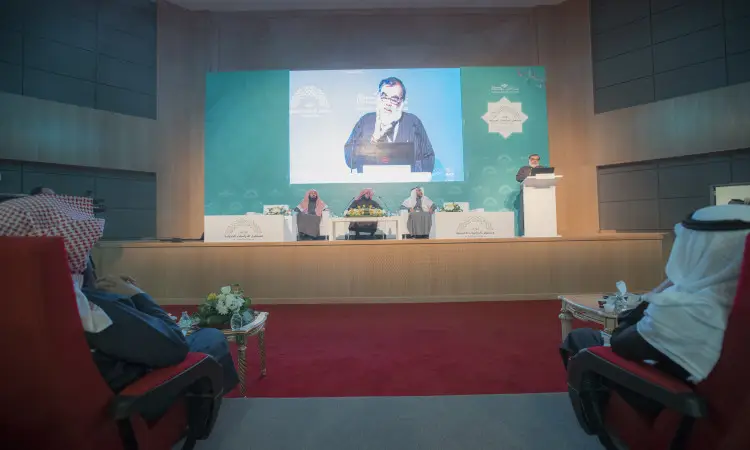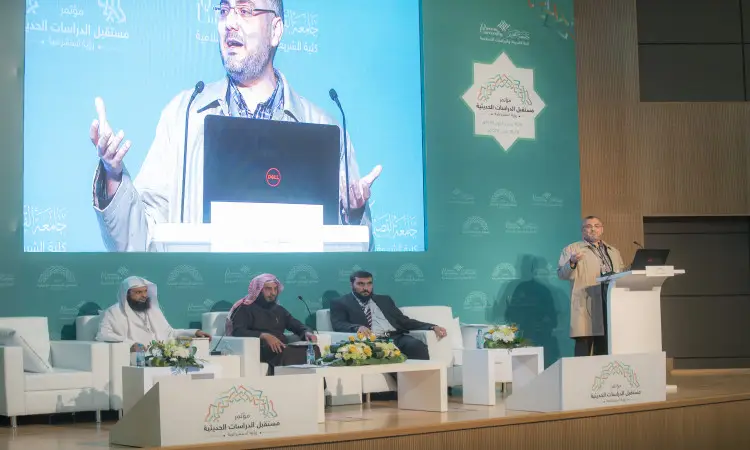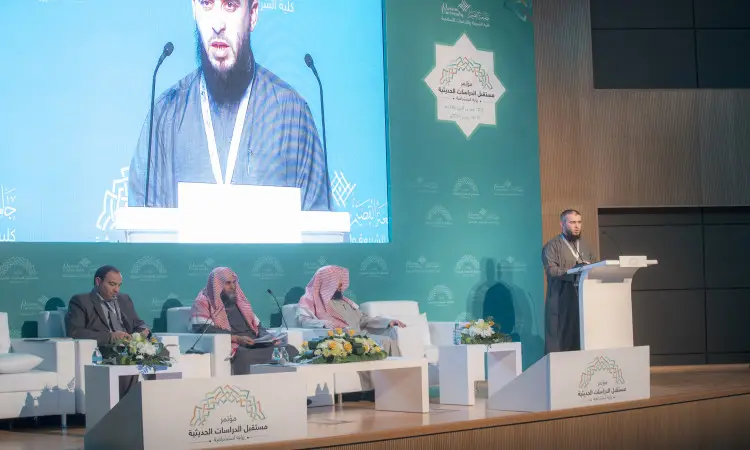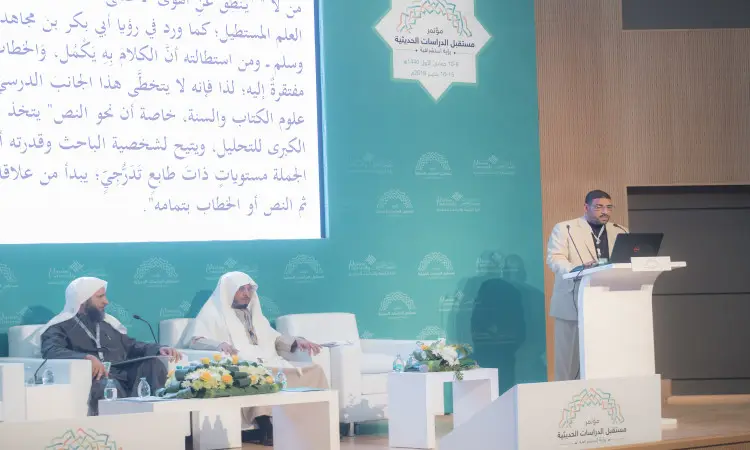The University, represented by the College of Shari'ah and Islamic Studies, concluded the work of the international scientific conference, which was titled "The Future of Hadith Studies. Dr. Ibrahim bin Saleh Al-Humaidi, a professor at the Department of Qur'an and its Sciences at the College of Sharia and Islamic Studies at Al-Qassim University, presented the fourth session entitled "Hadith Training and Education." The first scientific paper on "Using e-learning tools in teaching Hadith as an interactive course." The paper showed the use of modern applications and websites in the academic education of Hadith as an integrated distance course and displaying it on websites.
These courses should be similar to language courses or courses in scientific and skilled disciplines, and in the manner of advanced scholars in dividing any of the Islamic sciences into three levels; beginners, intermediate and advanced by adopting a specific book at each level and presenting it on one of the modern electronic programs such as the blackboard method or any other method, and there is interaction, training and application of the science of hadith in an integrated manner that shows the student the extent of his understanding and absorption of the lesson so that he can move to the next units or levels after he has mastered the previous lessons, all electronically without the need for a direct teacher or joining an academy.
The second practical paper entitled "Teaching Hadith Courses Remotely at King Faisal University as a Model" was presented by Dr. Ahmed bin Faris Al-Salloum, Associate Professor at the Department of Sharia and Islamic Studies, Faculty of Arts, King Faisal University, in which he presented the dissemination and communication of the Sunnah through teaching Hadith courses in programs that are taught remotely using modern technology, and the research chose King Faisal University as a model for this, as it is one of the oldest universities that experimented with e-learning, and Hadith courses had a large share of this rich experience based on direct and indirect interaction within an electronic system. "Teaching Hadith Courses Remotely at King Faisal University as a Model," in which she addressed the definition of Hadith courses at King Faisal University, the teaching methods adopted to teach these courses remotely, and the means used to evaluate the learners of these courses, and proposed a developmental vision for the dissemination and communication of the Sunnah through e-learning.
The third scientific paper dealt with "The impact of using the (K.W.L.H) strategy on the achievement of the students of the College of Shari`ah and Islamic Studies in the Prophetic Year at Qassim University and their attitudes towards it" presented by Dr. Ali Muhammad Ahmad Rababaa, Professor at the Department of Sunnah and its Sciences at the College of Shari`ah and Islamic Studies at Qassim University: This study aimed to identify the impact of the K.W.L.H. strategy and the standard method on the achievement of students of the College of Shari`ah and Islamic Studies at the University of Qassim and their attitudes towards it.
The session concluded with a working paper presented by Dr. Abdelkader Ahmed Soleimani, Professor of the Faculty of Humanities and Islamic Sciences at the University of Oran, entitled "Academic Master, Hadith and its Sciences, as an Example", in which he explained that there is no doubt that higher education institutions, with their research centers and scientific laboratories, in the Islamic world, are striving to improve their academic, administrative and technical performance to achieve what society aspires to, in order to raise its level of well-being and progress, and to be in the forefront and in the best image in front of Western societies. There is no doubt that higher education institutions, with their research centers and scientific laboratories, in the Islamic world are striving to improve their academic, administrative and technical performance to achieve what society aspires and aspires to, in order to raise its level of well-being and progress, and to be in the forefront and in the optimal image in front of Western societies.
Fifth session
The fifth session was held under the chairmanship of Dr. Turki bin Fahd Al-Ghameez, Professor of Sunnah and its Sciences at the College of Sharia and Islamic Studies at Al-Qassim University, where Dr. Radwan bin Ibrahim Lakhshin from the Prince Abdelkader University of Islamic Sciences in Constantine, Algeria, presented "Cognitive integration and its impact on the integrity of understanding and deduction. The paper aimed to introduce an idea whose origin is known, and to which something new is added, its origin is known that one of the necessities of ijtihad and speech in matters of the Shari'ah is that the speaker and mujtahid must be familiar with all Shari'ah sciences related to the matter under discussion, including knowledge of the Qur'an, knowledge of the Sunnah, and knowledge of the science of jurisprudence, the science of fundamentals, Arabic sciences, the science of doctrine, biography, history, histories, histories, and so on. This is a fact throughout history for those who have read, adding that some of the sharia issues are related to other sciences outside the field of sharia sciences, such as geography, acoustics and linguistics, medicine and astronomy, law and economics, and so on, making the correct judgment contingent on knowledge of all these sciences, and this full knowledge of all these issues is what we called here "cognitive integration".
Associate Professor in the Department of Arabic Language, Faculty of Arts and Humanities, Jazan University, Dr. Waleed Muqbel Al-Sayyid Ali Al-Deeb presented a scientific paper entitled "Foreseeing the Future in the Prophetic Hadith: A Semantic Study through Grammatical Tools." This research examined the significance of some grammatical tools on foresight, such as condition tools, interrogation tools, reception tools, and expectation tools, and linked them to foreseeing the future in the hadith with the aim of emphasizing that the hadith text has absorbed the meaning of those tools and that the use of these tools in the prophetic hadith was intentional, so their expression was appropriate for the purpose of foreseeing the future.
For his part, Dr. Yasser bin Abdullah Al-Turaiqi, Assistant Professor of Hadith at the Department of Sunnah and its Sciences at the University, presented a scientific paper entitled "Literal Inference by Prophetic Verbalization and its Future in Legal and Linguistic Studies." The paper addresses the issue of verbal inference by the Sunnah and sheds light on some of the expansion of this type of inference, in an attempt to establish a basis from which the inferrer and critic can proceed, The research addresses the issue of verbal inference, highlighting some of the expansion of this type of inference, in an attempt to establish a basis from which the inferrer and the critic can proceed, and to highlight the controls by which the validity and rectitude of the inference can be known, as well as the obstacles and impediments to the inference.
Dr. Dalal Shatnawi and Dr. Samar Rababaa, Assistant Professor at the College of Islamic Studies at Taibah University, presented a joint working paper entitled "Employing Thinking Skills in Understanding the Prophetic Sunnah." They talked about explaining the concept of thinking skills and clarifying the role of some of them in understanding and guiding the Prophetic Sunnah, and how to develop thinking skills and the use of the mind in serving and understanding the Prophetic Sunnah, by showing the use of some of these skills by the Prophet, peace be upon him, and knowing the Prophet's intention in using them, in order to achieve the objective of the study, the inductive-deductive method was used, which is based on studying the issue and extrapolating the text.
Dr. Ahmad bin Abdullah Al-Batli, Professor of the Department of Sunnah and its Sciences at the College of Fundamentals of Religion at Imam Muhammad bin Saud Islamic University, presented a scientific paper entitled "The Fiqh of the Hadith Text - A Vision of Foresight". Accordingly, the importance of the research topic and the reasons for its selection are evident, and the study recommends the need to care for and serve the Sunnah, as well as its dissemination by all means and various technical methods for the people of knowledge in the era of information flow, as well as the need to disseminate it by all means and various technical methods for the people of knowledge In the era of information flow, researchers, institutions and scientific centers should make serious use of technical development, especially in the dissemination of sharia science, especially the science of the Prophetic Hadith, and what concerns the future of the Hadith text in form and content, in matters of morals and values, monotheism and doctrine, worship and rituals, transactions and contracts, morals and ethics, and other political, security, economic, climatic, and other matters.
Dr. Abdul-Rahman bin Abdul-Aziz Al-Aql, Associate Professor at the Department of Sunnah at the College of Shari'ah at Qassim University, presented a paper entitled "Downloading Sunnah Texts to Reality (Controls and Prospects)" He dealt with six topics: The concept of downloading the Sunnah texts to reality, which includes a definition of the title terms: (downloading), (text), (reality), and the second axis: Approaches to Downloading Sunnah Texts, in which he mentions two approaches to downloading Sunnah texts: The leniency approach to tasawwuf and the moderation approach to tasawwuf: Controls of Translating Sunnah Texts to Reality, which includes a description of the controls related to the Sunnah text to be downloaded, the controls related to the person who downloads the Sunnah texts to reality, the controls related to the reality to which the Sunnah text is downloaded, and the controls related to the process of downloading, and the fourth axis: Examples of the wrong transcription of the Sunnah texts, in which eight examples of hadiths are mentioned; the transcribers were wrong in transcribing them, and the fifth axis: The implications of the misapplication of the Sunnah texts, in which a number of negative consequences of this misapplication are mentioned, and the sixth axis: A forward-looking view of the future of Sunnah textualization, in which practical steps are suggested to be followed to achieve a correct future vision of Sunnah textualization.
At the end of the session, Dr. Muhammad Ibrahim Hassan Osman, Assistant Professor and Head of the Department of Linguistics at the Faculty of Arabic Language, Sultan Abdul Halim Muazim Shah International Islamic University in Malaysia, presented on "The Impact of Linguistic Knowledge in Understanding the Prophetic Hadiths," where he showed the importance of linguistic sciences in understanding the Prophetic Hadiths, showing the role of the purposes of Arabic grammar in understanding the Sunnah and indicating its meaning, and showing the impact of syntax in extracting jurisprudential rulings from the Prophet's sayings, the research aimed to show the impact of modern theories (text grammar theory as an example) in understanding the Prophet's speech, and the research issue is that it studies a very important matter which is summarized that since the
Sixth session
The sixth and final session of the conference was held under the title "Jurisprudence of the Hadith Text", chaired by Dr. Abdullah bin Hamad Al-Sakkar, Professor of Comparative Jurisprudence at the College of Sharia and Islamic Studies at the University of Qadi Ayyad University in Marrakech. Dr. Abdulati Yaqouti presented on "Jurisprudence of the Hadith Text and its relationship with the human sciences - Islamic sociology as a model." He indicated that the human sciences are of great interest to those engaged in scientific research in all parts of the world, making it imperative for Muslims not only to import these sciences without scrutiny, especially since they have sources of knowledge that allow them to
The research issue is summarized in the fact that today's Muslims have become dependent on others in the humanities, especially sociology, as they come up with solutions to their problems from Western social theories, which are the product of a certain faith and culture, which may not be in harmony with the Muslim faith and culture, hence the question: Can we not find solutions to the social issues that we live in the Hadith text?
Dr. Zatoun Kharif, Professor of the Institute of Islamic Sciences at the University of Martyr Hamma Lakhdar in Oued, Algeria, presented a paper entitled "The Appropriateness of Books, Doors and Hadiths from the Books of Hadith", in which he explained the appropriateness of books, doors and hadiths from the books of Hadith, and their impact on the understanding of the narrated text, and the derivation of rulings and guidance from it, this study came in four investigations. While the second research was devoted to the study of the occasions of the arrangement of the books of the books of hadith and their impact on the understanding of the hadith, while the third research was concerned with the occasions of the translations (titles of chapters) of the hadiths of the chapters and their impact in facilitating the understanding of their contents; and the last of these researches dealt with the occasions of the arrangement of the hadiths of the chapter and their impact on the understanding of the hadith: Demonstrating the thematic connection between books and chapters in hadith works, facilitating the combination of different hadiths, indicating copying, understanding the content of the hadith chapter, facilitating extrapolation from the hadith, and training on the correct handling of the texts of the Sunnah.
Associate Professor and Vice Dean of the College of Islamic Studies at Kassala University, Dr. Haj Hamad Taj al-Sir Haj presented a research paper on "The Concept of Quality through the Prophetic Sunnah." This research aims to define quality as a contemporary term and its applications and fields through the texts of the Sunnah. The researcher presents the hadiths contained in the Sunnah and relates them to the areas of quality that are mentioned in them, in belief, worship, behavior, sales and transactions, and the researcher reached several results, the most important of which is that quality in the Prophetic Sunnah is a comprehensive and complete commitment as much as possible to perform actions and actions correctly with continuous improvement throughout life in all areas
For his part, Professor of Administrative and Constitutional Law at the College of Sciences and Humanities, Department of Law, Shaqra University, Dr. Ikrami Bassiouni Abdul Hay Khattab, presented a research paper entitled "Utilizing Hadith Texts in the Enactment of Legal Texts." He explained that God Almighty sent the Prophet with guidance and the religion of truth to show people the law of Islam and guide humanity to the light of truth and bring them out of the darkness into the light, and the Hadith texts of the Prophet contained many rules and principles that can be used in developing and drafting legal texts, and linking between Hadith texts as shari'a laws and legal texts as positivist laws is an idea worthy to be explored.
While maintaining the sanctity of the hadithic text and the dependence of the positive legal text, which is subject to change and modification according to contemporary circumstances and variables, the link between the two texts can be logical, and around the mechanism of linking and utilization between the hadithic text and the legal text, the phrases and pages of this research revolve, and the researcher discussed during this scientific paper "the hadithic text and the legal text" to define the hadithic text and the legal text and the proposed linkage mechanism between the two texts and the limits of this linkage.
Dr. Sulaiman bin Abdullah Al-Saif, Professor of Hadith, Department of Islamic Culture, College of Education, University of Hail, participated with his scientific paper on "Downloading Prophetic Hadiths to Reality: Prospects and Controls". This research was summarized in referring to some areas in which the researcher can download the texts of the Sunnah, such as (modern sciences, strife, epics and the conditions of the Hour, and cultural values). In addition to detailing the scientific controls derived from the Book, the Sunnah, and the methodology of the scholars in the field of downloading the texts of the Sunnah, which ensure that the downloading of the Sunnah texts is far from error and deviation and closer to the right, these controls included the pillars of the downloading process, namely (the downloaded text, the downloading method, the reality to which it is downloaded, and the downloader).
Dr. Ali Najar Muhammad Hassan, Associate Professor of Syntax and Morphology at the Department of Arabic Language, Faculty of Arts and Humanities, Jazan University, reviewed his scientific paper "Exploring the depths of the souls and educating them in the honorable prophetic hadith", as the Prophet's legislation did not stop at their past, or their present that he lived with them only, but it extended to the future of all mankind. This extended to the future of all mankind, and anticipating that future in a way that penetrates deep into the human psyche and works to educate it, especially in the social aspect, but also in an innate characteristic of human beings, namely sexual orientation, where the research studies the Sunnah's anticipation of this innate tendency and its treatment through a single hadith that refers to others; namely, his saying to those who asked about asking permission to his mother:"... would you like to see her naked?..."The study of this anticipation comes in the light of a modern grammatical theory, namely the theory of (textual grammar), which is based on seven criteria: ( Plotting ــ Plotting ــ Intentionality ــ Acceptability ــ Intertextuality ــ Contextuality ــ Informativeness ــ Informativeness).
At the end of the session, Associate Professor at the Department of Sunnah and its Sciences at the College of Shari`ah and Islamic Studies at the University, Dr. Mutaib bin Salem Al-Khumshi, presented a scientific paper entitled "The Terminological Study of the Sunnah Texts: Vision and Approach." The terminological study of sciences in general represents a rich trend for researchers in the present era, but in particular it should have a great deal of attention in legal studies, and while the purpose of downloading the revelation is to reveal and understand it, one of the essentials is to understand the terms contained in the language of the law, which is a discourse that is fully applicable to the revelation of the Sunnah.






